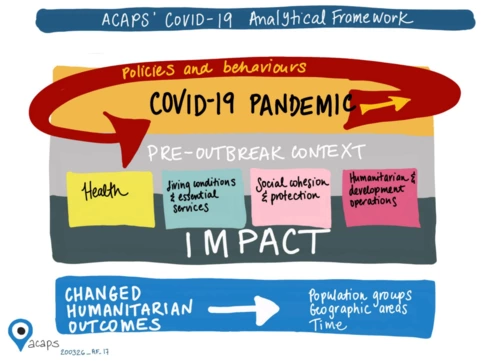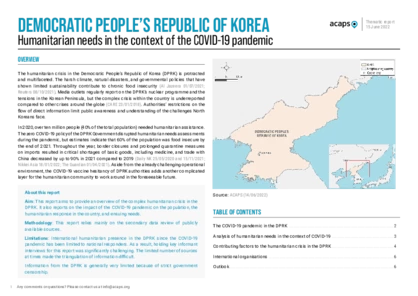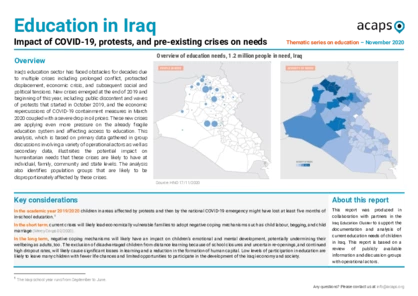Throughout this period, ACAPS developed a COVID-19 analytical framework to guide a coherent approach to analysis across the world, developed two global datasets, and published over 30 analytical products through its teams in Bangladesh, Colombia, Geneva, and Jordan.
GLOBAL DATASETS
COVID-19 GOVERNMENT MEASURES
In mid-March 2020, ACAPS began compiling a dataset of government measures put in place across the world to contain the pandemic. It remains available for organisations and individuals to use in their analyses. In late May 2020, ACAPS compiled a second dataset of humanitarian exemptions to government measures to help explain what allowances were made across the world to enable humanitarian operations to continue to support those most in need.
_______
SECONDARY IMPACTS OF COVID-19
The ACAPS COVID-19 Analytical Framework, together with the data collected for the Government Measures Dataset, provided the foundation for the Secondary Impacts Analytical Framework and accompanying dataset. This dataset tracked secondary impacts across a wide range of relevant themes, such as economy, health, migration, and education.
A group of student volunteers from various universities worldwide supported the data collection.
Analysis products
on
COVID-19
15 June 2022
DPRK: Humanitarian needs in the context of COVID-19
DOCUMENT / PDF / 714 KB
This report aims to provide an overview of the complex humanitarian crisis in the DPRK. It also reports on the impact of the COVID-19 pandemic on the population, the humanitarian response in the country, and ensuing needs.
10 January 2022
Yemen: The current COVID-19 situation and vaccine hesitancy
DOCUMENT / PDF / 2 MB
This report aims to support humanitarian responders by explaining the barriers to vaccination in Yemen through a review and analysis of available information. It provides an overview of what is known about the COVID-19 situation in Yemen and how the pandemic has unfolded.
07 March 2021
Scenarios: Post-COVID-19
DOCUMENT / PDF / 594 KB
These scenarios focus primarily on the potential ways the global humanitarian situation may change over 2021, although they are anticipated to remain valid well into 2022. It should be noted that the scenarios are not mutually exclusive. Because the focus is global, it is possible for one scenario to transpire in one region or country while the other scenarios may develop elsewhere.
09 November 2020
Iraq: Impact of COVID-19 on Education
DOCUMENT / PDF / 896 KB
This analysis illustrates the potential impact on humanitarian needs that ongoing crises in Iraq are likely to have at the individual, family, community, and state levels. The analysis also identifies population groups that are likely to be disproportionately affected by these crises.







